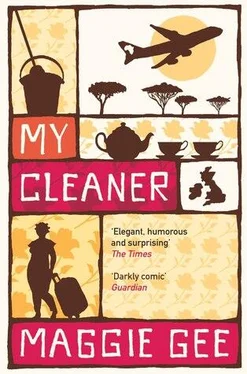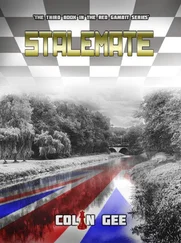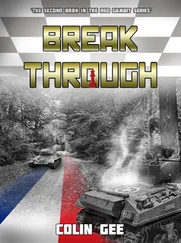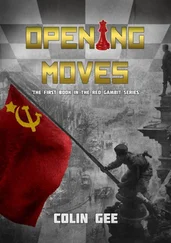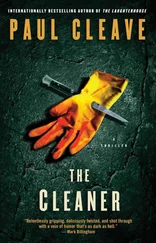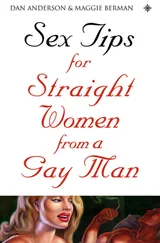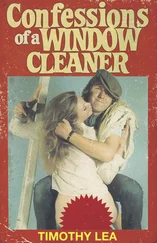And the trees have begun to look lonely now. It is strange, and sad, to see them naked. I had forgotten how the trees become naked. In Uganda, the trees keep their leaves. I do not want to see everything naked. And last night in the garden, Justin took off his clothes, and I was no longer sure he had got better. He shook and trembled like a tree in the wind. They are not so strong as they like to think, these tall young men, these fine young men. Do they realise this, the young western women, when they laugh at the boys and make them feel small? When I last saw Jamie, he was not full grown. They are easy to hurt. Maybe easy to kill.
I rarely hurry, but my feet go faster, because I must keep ahead of the voices, whispering things I do not want to hear, whispering things that someone has told them. My friend the accountant, he knows also. But it was not him who told the maids. I have shown them the photos of Jamil in my purse. We all show photos of our children. I make myself hurry, not to think about it, to keep the cruel voices out of my head, that say all day long, at the back of my mind, her son is lost, her son is — no, I must run away, I will keep ahead—
But when I try to hurry, I become breathless, and my heart beats too fast, and I have to slow down. It seems that England is making me ill. Why should my flow be like pink water? I suppose the sickness comes from my heart, because recently I am too sad to go dancing, and even in church I am sometimes lonely, unless I go east, to Waterloo, but the buses are slow, and the underground eats money, so usually I go to the local church and sit with the other black people, Nigerians, Somalis, Ethiopians, Jamaicans, and they only say ‘Hallo’ and ‘It’s cold’ and ‘How are you?’, because they do not really know me, and last week I stayed to have coffee with the vicar, Mr Andy, who asked all newcomers to stay, but he was too busy to talk to me, so I had a stale biscuit and went away. (But still next week I will go back again, because it is Harvest Festival.) If I am still here. If I am well.
Perhaps this city is poisoning me.
Perhaps Miss Henman is poisoning me.
I miss my son. I miss my son .
Now I go to the market and start to buy shirts. Pale blues and greens for a gold-skinned boy. The jeans are long-legged and lean-waisted. I do not really know how tall he is, I do not really know how slim he is — I do not know the face of my own son, but I smile at the stallholder and manage to stop crying. I imagine Jamie wearing them: the girls would love him. He will still have brown eyes that glow like amber, and run as swiftly as the wind. He used to race against his dog, Liquorice, but soon he grew too tall, and too fast. Surely all the girls want to marry him. And I will have gold-skinned grandchildren. But the wind shakes the stalls and the clothes fly like kites, flicking out like whips, loud and spiteful, and there are white jackets and white trousers, kicking—
I hurry on to spend more money, although everything here is very expensive, ten times as expensive as in Kampala. Still, Jamie must know that his mother loves him, that only the best would be good enough, that I shall never stop loving him. Shall never, ever stop loving him.
The seventy pounds disappears very quickly, and afterwards, my purse is empty, and I feel empty, and my hands are shaking.
I do not want to go back again to the house where the Henman and Justin are waiting together, where she is waiting for me with her son, and she has everything, and I have nothing. Perhaps she will be nosy, and look at my presents, and perhaps she will be angry, and send me away.
And if she is nosy, what will I tell her? How could I bear to share my sadness? She would peck at it. She would dirty it. And then I would not even have that. She would wave her busy little hands at me, and say we must search, and telephone people. But nothing would happen. He is in God’s hands. In the hands of the God of glory.
I will not tell her about my trouble. How Omar phoned, and his voice had grown old. He told me that our son had gone missing. And this was at the time when the city of Tripoli was boiling with anger against America, because of the war against Iraq. There had been big marches. The young men were in a passion. Jamie went to all the demonstrations. There were arguments at home, more arguments. Omar insisted he did not lose his temper. Then one morning, Jamil was not there. And Omar had heard that a few of the young men, those rich young men with their empty lives, had set off for Iraq to volunteer, travelling through Syria, by bus, overland, burning to fight in their own jihad . I did curse Omar, which was unfair. He swore he had tried to restrain our son, but sometimes restraining him made him more angry. In any case, nothing at all was certain. No one could confirm where Jamie had gone. Omar has heard nothing since Jamie left, or if he has, he has not told me. I long for his call. I dread his call.
Besides, there are other possibilities. That Jamie was trying to find me in Uganda. But he had no money to fly to Entebbe. Better if my son has gone to Iraq. Because no one can cross, by land, into Uganda, not from the north, where the boy would be. Only Kony’s devil army and the children they capture.
If Jamie did that, he is no longer alive.
If Jamie did that, my life has been wasted.
I will not tell my secret to the Henman, who has her son, and complains about him, and wails and moans, and is pleased with nothing.
And so, although my feet are weary, although my legs are like lead this morning, I catch a bus towards Zakira’s flat. Perhaps she will come back with me to the house. I will bring her back with me as evidence that I am a good and helpful person.
Of course I am afraid that the Henman will sack me. But surely, not if I can bring her a grandchild. Although Zakira is frightened to meet her, because she is a Muslim, and Moroccan; but she grew up in England, and has a degree, and will soon be rich, with her MBA. And the child will surely be beautiful, with parents like her and Mr Justin.
The wind is deafening, shouting and battering, howling his name, Jamie, Jamie . I ring the bell as loud as I can. Zakira must let me in out of the cold.
After what seems like days, Zakira comes to the door, and she asks me inside, but she does not smile. “Sorry to keep you waiting, I couldn’t turn the tap off, it’s driving me mad, drip drip dripping .”
When I ask her to come with me, she looks serious. “Look, I’ve thought about it. I was mad, last week. I can’t just butt in there, eight months pregnant. Have you told him about me?”
“You said I must not.”
She has made me some tea, but I still feel empty, and I ask her, has she got bread, or a biscuit, and she gives me some biscuits, and I feel better, and the tap keeps dripping, like a tiny gun.
Then I think, how hard Zakira’s life must be, here all on her own, with the baby coming, and the wind howling around the windows. And then I start to feel more cheerful, or perhaps the biscuits were good for me. I start to forget about my shopping. I start to feel like myself again.
Because Mary Tendo is a happy person. When there is a chance, I am always happy.
Zakira tells me, “It is all hopeless,” and this reminds me of Mr Justin, who said it was hopeless when I told him to ring her.
And yet, I know that nothing is hopeless.
( Except only some things are completely hopeless. Zakira is lucky not to know about them .)
I say to her, “ Zakira , nothing is hopeless. I do not know how, but I am going to help you.”
And then she smiles, and says, “Mary, I believe you.” But still she refuses to come with me today. “Besides, the pipe under my sink is leaking. I have to get everything out and clean it. The flat must be right before the baby arrives.”
Читать дальше
